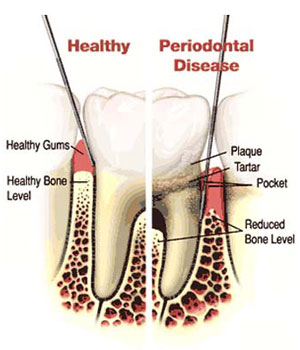 Periodontal Disease (Gum Disease)
Periodontal Disease (Gum Disease)Gum disease begins when plaque builds up along and under the gum line. In its early stage, called gingivitis, the gums become swollen and red due to inflammation, which is the body’s natural response to the presence of harmful bacteria. Sometimes gum disease makes your gums tender and more likely to bleed. At this stage, the problem is reversible and can often be fixed by daily brushing and flossing and regular dental care.
A more severe form of gum disease develops if gingivitis remains untreated and is called periodontal disease. Periodontal disease is an inflammatory disease that affects the soft and hard structures that support the teeth. The gums begin to pull away from the tooth and supporting gum tissues are destroyed. Bone can be lost, and the teeth may loosen or eventually fall out.
Chronic periodontitis, the most advanced form of the disease, progresses relatively slowly in most people and is typically more evident in adulthood. Although inflammation as a result of a bacterial infection is behind all forms of periodontal disease, a variety of factors can influence the severity of the disease. Important risk factors include inherited or genetic susceptibility, smoking, lack of adequate home care, age, diet, health history, and medications.
Bad breath that won't go away
Red or swollen gums
Tender or bleeding gums
Painful chewing
Loose teeth
Sensitive teeth
Receding gums or longer appearing teeth

Research has shown a link between periodontal disease and diabetes, heart disease and stroke, respiratory diseases, and pregnancy problems. Therefore, treating gum disease can save your teeth and keep other health conditions from developing.


Brush your teeth twice a day, in the morning and before bedtime, with fluoride toothpaste. Make sure to brush all sides of your teeth, as well as, your tongue.

Floss or use another between-the-tooth cleaner daily to remove plaque and bits of food from areas your toothbrush can't reach.

Eat a balanced diet for good general health and limit sugary snacks. Avoid tobacco, smokers are more likely to develop periodontal disease & tooth loss.

Visit your dentist regularly. Professional cleanings are the only way to remove tartar, which traps bacteria along the gum line.